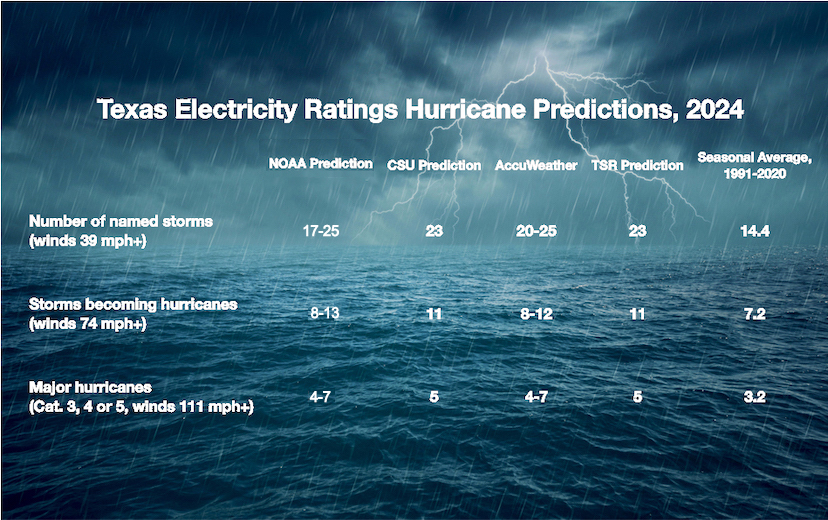NOAA Says “Above Normal” Hurricane Season

June in Texas not only means the start of summer but also the official start of hurricane season. NOAA released its 2024 Hurricane season forecast back on May 23. Like other hurricane forecasts we covered earlier, NOAA is forcasting an 85% chance of an above-normal season. And given summer temperatures in the Atlantic Ocean, “above-normal” is not an exaggeration.
- 17 to 25 total named storms (winds of 39 mph or higher)
- 8 to 13 are forecast to become hurricanes (winds of 74 mph or higher)
- 4 to 7 major hurricanes (category 3, 4 or 5; with winds of 111 mph or higher)
Why Will This Hurricane Season be “Above Normal”
NOAA explains the following factors can help create the kind of summer conditions that produce active Atlantic hurricane seasons.
- Weaker trade winds coming off the coast of Africa.
- Weaker vertical wind shear off west Africa, stretching westwards.
- An above-average West African monsoon. These systems produce African easterly waves that carry enough heat and churn up air currents to seed tropical storm systems.
- Near record warmer than normal sea surface temperatures (SSTs) across the Main Development Region (MDR). That is, the area stretching from west Africa to the Caribbean.
- NOAA expects a La Niña to emerge sometime this summer (possibly late-July). La Niñas tend to reinforce conditions that spawn tropical storms and hurricanes.
Does NOAA Predict Hurricanes Will Hit Texas This Summer?
The Houston derecho on May 16 left many without power for days. So, it’s natural to wonder if a tropical storm will hit Texas this summer.
While there’s a possibility for a tropical storm or hurricane to hit the Texas coast, there’s no certainty. Nor can anyone say if it will happen or when. However, there are things that all Texas residents need to be reminded of in advance.
1. Hurricanes in the Gulf Mean Trouble. Any time a tropical storm forms or enters the Gulf of Mexico, Texas residents should pay attention. The best way to stay informed about possible tropical storms threats is to check the National Hurricane Center. This way, you can see the disturbances that NOAA forecasters are tracking. Tropical storms in the Gulf also threaten to shut down off shore oil and gas platforms. Such shut downs can raise the price of the natural gas used to generate electricity. That can ultimately increase your electricity rates. So, if you haven’t locked in at least a 12 month cheap electricity rate, do it now.
2. Storm Surges Endanger Coastal Areas. High winds in front of a hurricane blow very high ocean tides towards land. Sea level rise since 2000 has pushed the average height of storm surge in the Gulf to over 20 feet. Elevations along much the Gulf coastline are barely more than 10 feet above sea level. If you live in such an area, always be ready to evacuate in land.
3. Flooding is the Biggest Inland Danger. During tropical storms, rain-swollen streams and creeks can grow into river over a mile wide. And all that water can wash out bridges and entire roadways. Flood water is a powerful force and it only takes one to two feet of water to float a car. Nearly half of all drowning deaths during storms resulted from people driving vehicles into flooded areas and getting washed away. So, if you see a flooded road ahead of you, turn around, don’t drown.
4. Be Ready for Your Power to Go Out. High winds can still cause enormous damage especially to trees and power lines. As many in Houston have already seen this spring, recovering from natural disasters can take days or even weeks. Sheltering in place may be worth trying for a while. However, it can be extremely dangerous for the very young, the elderly, or for people with chronic illness. In that case, be prepared to evacuate to a safe location away from the storm.
As always, it only takes one storm to create a disaster. The most important thing to do is to make a plan for keeping your family safe. Be sure to check https://www.texaselectricityratings.com again this summer for more information as the season progresses.

